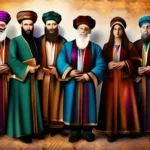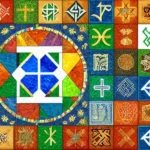Exploring the factors influencing religious beliefs and practices
In this article, we delve into the fascinating world of religious choices. We’ll examine the various factors that influence an individual’s decision to adopt a particular faith, from personal experiences and cultural background to societal pressures and spiritual seekings.
The role of personal experiences
How do personal experiences shape one’s religious beliefs? It’s like planting seeds in a garden; each experience, whether joyful or challenging, nourishes these seeds and helps them grow into strong, deeply-rooted beliefs. Have you ever wondered how your upbringing influenced your faith journey?
Is it the stories told by your grandmother during family gatherings, or the lessons learned from teachers at a young age that planted the first seeds of your religious beliefs?
The environment in which we grow up plays a significant role. For instance, if you were raised in a devout Christian household where church attendance was mandatory and Bible verses were recited daily, those early experiences can shape your worldview profoundly. Similarly, growing up in a Muslim community might expose you to different practices and values that resonate with your sense of identity.
Life events also act as catalysts for religious conversion or reevaluation. Consider the impact of a significant loss or a profound moment of personal transformation. During such times, people often seek solace or guidance from their faith, sometimes leading them to embrace a new belief system entirely. Is it possible that your life’s biggest challenges led you to explore different religions?
Moreover, the journey doesn’t stop at childhood and adolescence; it evolves as we navigate through adulthood with its own set of trials and triumphs. Traveling to new countries or meeting people from diverse backgrounds might open doors to understanding and adopting a completely different religious practice.
Can you recall any pivotal moments in your life that made you question your previous beliefs and led you to embrace something new?
The intertwining of personal experiences with the cultural background and societal pressures will be explored further. Understanding how these factors work together can provide a richer picture of why people choose their religions.
Cultural background and societal pressures
Imagine standing at the crossroads of life, where every path represents a different religious belief. How do you choose which one to follow? Often, cultural background and societal pressures play significant roles in shaping these choices. Have you ever wondered why some families remain steadfast in their faith while others explore new spiritual landscapes?
Cultural background acts like the soil that nurtures our beliefs, deeply embedding them into who we are. For many individuals, religion is not just a personal choice but a collective identity handed down through generations. Think of it as a family tree where each branch represents a different religious tradition. The roots run deep, connecting past and present. How does this cultural backdrop influence your own journey?
Societal expectations also weigh heavily on our decision-making process. In many communities, there is an unspoken pressure to conform to certain beliefs or practices. It’s like being part of a grand symphony where each member has their role. Some may feel compelled to play along, while others might seek out different notes that resonate more personally with them. How do these pressures influence your religious choices?
Consider the metaphor of a river flowing through diverse landscapes; just as the river adapts to its surroundings, individuals adapt to the cultural and societal contexts they find themselves in. This dynamic interplay between personal beliefs and external influences often leads to complex decisions about which religion best fits one’s identity.
Whether it’s the comfort of familiar traditions or the quest for new meanings, understanding how culture and society impact our religious choices can shed light on this intricate decision-making process. It’s a journey that is both personal and communal, intertwined with the threads of history and the winds of change.
The search for spiritual fulfillment
The search for spiritual fulfillment is like a journey through a vast, intricate labyrinth. How do people choose which path to follow? For some, it’s as simple as finding a home in the familiar. They may have grown up in a particular faith and feel a deep connection to its teachings and traditions. But for others, the choice feels more like crossing into unknown territories, where every step is a question: Will this path lead me closer to understanding myself and my place in the world?
The quest for spiritual fulfillment often begins with a personal crisis or a profound moment of realization. Perhaps someone faces a life-changing event, such as a serious illness, the loss of a loved one, or a significant shift in their personal beliefs. In these moments, they might feel a need to explore different religious practices and philosophies. Do I find solace and meaning in the rituals of Buddhism? Could the Christian doctrine offer me guidance on forgiveness?
Often, people turn to religion as a way to explain the unexplainable. They may seek answers about their existence, purpose, and destiny. For some, it’s not just about finding answers but also about creating a sense of community and belonging. Can I find my tribe in a particular religious group? Will they share my values and support me through life’s challenges?
The allure of spirituality is multifaceted. It can provide comfort during difficult times, inspire personal growth, and offer a framework for ethical living. Some may be drawn to the simplicity and directness of certain religions, feeling that their practices are more straightforward or easier to understand. Others might find complexity appealing, seeking depth in teachings that require deep reflection and study.
The search for spiritual fulfillment is not just about choosing a religion but also about finding meaning in one’s life. It’s like selecting the right map on a long journey; each path has its own unique scenery, challenges, and rewards. The key is to keep an open mind and heart, to embrace the unknown, and to listen to the whispers of your inner self.
Religious diversity and tolerance
Imagine a world where every person carries their own unique story, like a suitcase filled with cherished possessions and cultural treasures. Each religion is just one of those items—different in shape, size, and significance but all contributing to the rich tapestry of human experience. In this diverse landscape, why do people choose which religion to follow? And how does religious diversity impact our global village?
Religious diversity acts as a melting pot, blending various cultural flavors into a vibrant mix that enriches us all. Just like trying different cuisines can broaden your palate, exploring different faiths can expand one’s understanding and empathy for others. However, this blend is not always harmonious; conflicts arise when differences in beliefs are met with intolerance.
Consider the importance of tolerance—it’s like a lubricant that keeps the wheels of society turning smoothly. When communities learn to respect each other’s religious practices and beliefs, they create an environment where everyone feels valued and heard. This mutual respect fosters a sense of unity in diversity, which is crucial for building a harmonious world.
In today’s interconnected world, where news travels faster than ever, it becomes even more vital that we embrace religious tolerance. Imagine a city where people from different backgrounds live side by side—each bringing their unique traditions and beliefs. It would be like a bustling bazaar filled with stalls offering everything from spiritual guidance to cultural insights. Such a place thrives on diversity, where every religion is seen as a part of the greater whole.
So, let us strive to create such a world—a world where religious diversity is not just accepted but celebrated. In doing so, we not only enrich our own lives but also contribute to a more peaceful and understanding global community. After all, isn’t the quest for spiritual fulfillment about connecting with something larger than ourselves, something that unites rather than divides?
The role of reason and critical thinking
The role of reason and critical thinking play a significant, often underappreciated, role in shaping one’s religious beliefs. Is it not true that our minds are like gardens, carefully cultivated by our thoughts and decisions? Just as we might consider the evidence before planting seeds to ensure a bountiful harvest, individuals weigh various reasons when choosing their faith.
Reason helps us understand the logical coherence of different religious doctrines. For instance, why do some find it hard to reconcile the complexity of certain theological concepts? Critical thinking encourages us to question and analyze these ideas, ensuring that our beliefs are not merely accepted but understood thoroughly.
Moreover, critical thinking often leads individuals to explore multiple faiths. Just like a curious explorer might visit several countries to gather insights, aren’t we all searching for the truth in this vast landscape of religious diversity? By examining different perspectives, people can make more informed decisions about their spiritual path.
The process of critical inquiry also helps individuals recognize and address potential biases. It’s like holding a mirror up to ourselves, allowing us to see our prejudices clearly. Can we truly understand the essence of any religion if we approach it with preconceived notions?
In conclusion, reason and critical thinking are not merely tools for intellectual exercise but essential guides on our spiritual journey. They help us navigate through the complexities of faith, ensuring that our beliefs are well-founded and meaningful in a constantly evolving world.
The impact of technology on religious choices
How does technology, specifically social media and online resources, shape our religious choices? In today’s digital age, it’s almost as if we’re wandering through a vast, interconnected forest where every tree represents a different path to spirituality—each one leading to a unique religious landscape. How do we navigate this dense woods without getting lost?
Consider the role of social media in this journey. It acts like a virtual compass, guiding us towards various spiritual paths. Imagine yourself as a pilgrim, armed with your smartphone, exploring different paths. You might stumble upon a tweet or a post that sparks curiosity about Buddhism, or you could discover a video that piques your interest in Judaism. Each digital breadcrumb can lead to a new path or reinforce the one you’ve already chosen.
Moreover, online resources offer unparalleled depth and breadth of knowledge. They provide a wealth of information—think of it as a library where every book is available at your fingertips. Do you dive into a comprehensive encyclopedia on Hinduism? Or perhaps explore the intricacies of Islamic theology through scholarly articles? These digital tools can be both enlightening and overwhelming, offering so much choice that it can sometimes feel like standing in front of an endless aisle in a grocery store, trying to decide what to put in your cart.
However, with this abundance comes the challenge of discernment. Just as you might need to sift through different fruits to find the ripest and most delicious one, so too do we need to critically evaluate the information available online. Is it reliable? Does it align with our values? These questions are crucial but can be daunting when faced with an infinite amount of data.
The impact of technology on religious choices is profound and multifaceted. It not only broadens our horizons but also complicates our decision-making process. Like a map that both guides us and confounds us, digital resources offer endless possibilities while demanding careful navigation to find the path most suited to our spiritual journey.
Conclusion
 By understanding the complex interplay of these factors, we gain valuable insights into human behavior and the role of religion in shaping our lives. This knowledge can foster empathy, tolerance, and mutual respect among people of different faiths.
By understanding the complex interplay of these factors, we gain valuable insights into human behavior and the role of religion in shaping our lives. This knowledge can foster empathy, tolerance, and mutual respect among people of different faiths.











